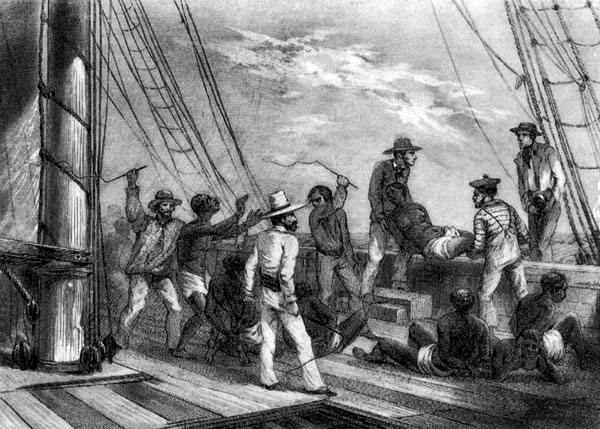 |
| "Overboard," courtesy of the Bristol Radical History Group |
Slavery. Just the
word makes us cringe. Moderns very nearly lose their minds in the simplest of
discussions over the subject, because of recent resurgence of racial tensions
in our country. But for any student of colonial history—really, of any history
at all—it’s absolutely unavoidable.
The first thing that comes to mind in relation to slavery
is, of course, the American Civil War. I’m currently neck-deep in writing a
story set right in the middle of the Civil War—which is still somewhat of a
shock to me, since colonial America is still my favorite—but this means I’m
having to grapple with the issue of slavery as never before. In considering how
it relates to the colonial era, and all the problems we moderns tend to have
even in merely discussing it, I’ve made some interesting observations about
this terrible fixture of history.
To begin with, like many other aspects of history, slavery
isn’t always taught in schools with the best of accuracy. Some are even under
the impression that slavery actually originated with the European “invasion” of
America. Well, not so. Slavery—the practice
of forcibly taking and keeping human beings for profit, subjugation, or
sacrifice—has been around nearly as long as humans themselves. The exact nature
of slavery, or the purposes behind it, might have varied, but the practice most
definitely did not start here in our country, or even with Europeans. Almost
every major civilization practiced slavery of some kind of another, from the Romans
to the Greeks and all the way back to the Egyptians and beyond, and then
forward to our time, perpetrated as human trafficking or an act of war by
extremist groups such as ISIS or Boko Haram.
Another problem of discussing such awful realities is a
moral one, because we never want to appear that we’re condoning or justifying
slavery in any form, but as historians we are obligated to acknowledge it as a
very real cultural and societal force.
It was a strongly defining force in American history, for
sure, as it was for many other nations. The case could be made that chattel
slavery, the term simply used to refer to treating people as property, was
first introduced to the Americas by Europeans, but slavery in various forms was
certainly not a new thing to the native populations.
| Christian slaves in Algiers, 1706 |

I'm looking forward to your articles. So much attention is placed on slavery during the Civil War era that not much attention is given to the practice of slavery from this nation's inception. Thanks for taking it on.
ReplyDeleteThanks, Anna! I hope I can do it justice!
DeleteYes, I am having to grapple with the fact that wealthy Cherokees owned slaves in the 1800s in the novels I am currently publishing & writing. Many people don't know that. Excellent start to your series, Shannon!
ReplyDeleteI just found this out, Denise! There is SO much information about this topic ... and it's a little scary writing about it in today's political climate, for sure.
DeleteThis is a really informative piece, Shannon. I think you said it well when you said that the history of slavery isn't always taught with the greatest accuracy. So true!
ReplyDeleteThank you, Naomi!
Delete